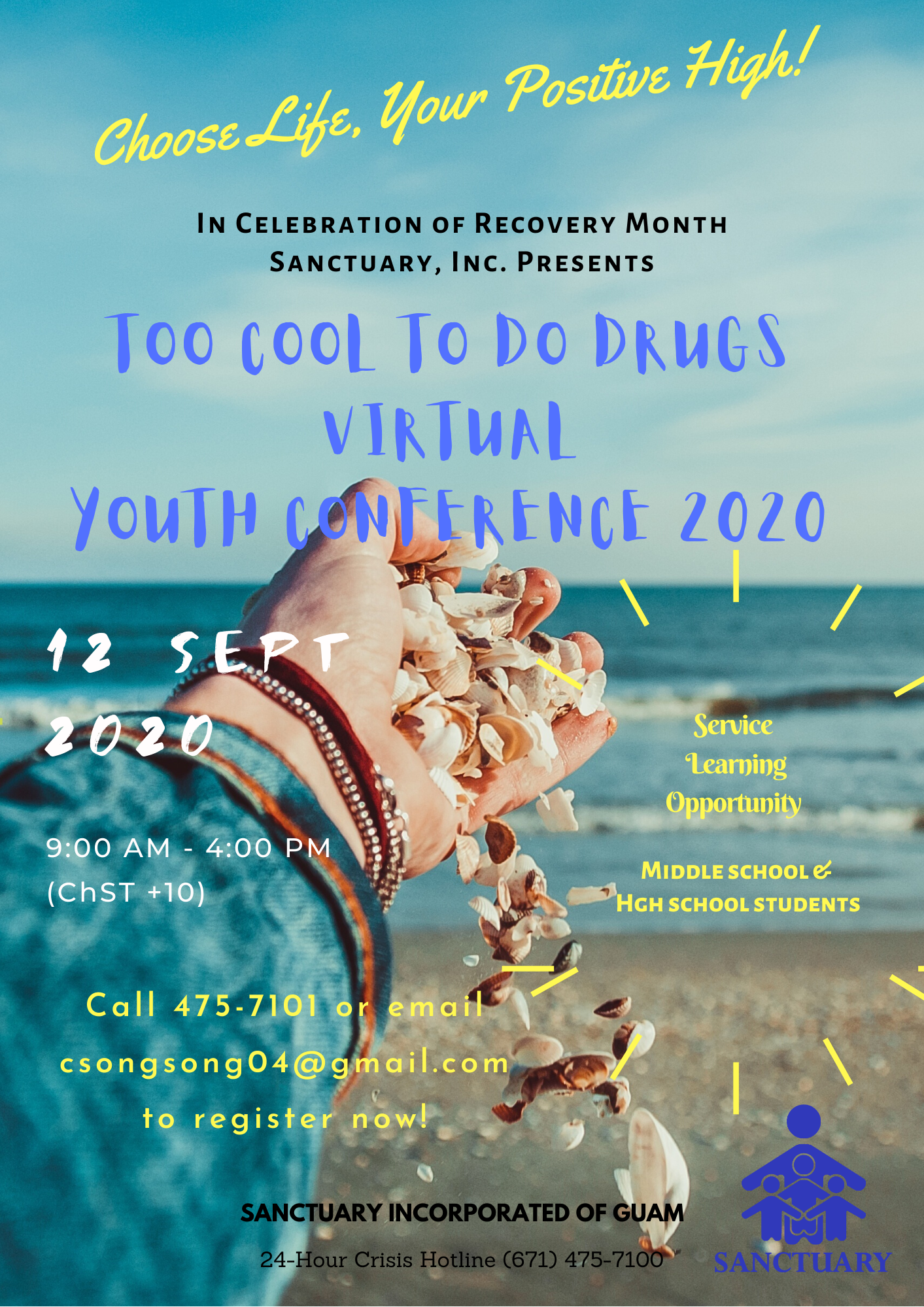Too Cool to Do Drugs Virtual Youth Conference 2020
Too Cool to Do Drugs Virtual Youth Conference 2020
- Status: Past Project
- Possible Hours: 6
- Categories: Social Justice, Peace and Kindness, Education and Literacy, Citizenship and Civic Engagement, Health and Wellness, History and Culture
- Schools: Open to All Schools
- Project Start Date: 09/12/2020
- Project End Date: 09/12/2020
Sanctuary, Incorporated of Guam is hosting our Too Cool to Do Drugs
virtual youth conference this September! We intend to reach out to provide service learning opportunity for all middle and high school students during our upcoming conference on September 12, 2020.
As a non-profit community-based organization, we seek to reach out to Guam’s youth and offer education and prevention skills in the struggles of substance abuse, suicide, and social/interpersonal relationships.
We seek to improve the quality of life for Guam’s youth through a virtual conference which engages the audience in discussions on topics that impact their lives, to include substance abuse prevention, suicide prevention, nicotine education, and more!

Preparation Instruction:
-Request for conference registration from school teacher/admin
-Have your parent/legal guardian or school teacher complete conference registration and email to csongsong04@gmail.com
-A link to join the event will be provided to your parent/teacher (Parent/teacher would need to indicate email on registration form)
-Further updates will also be sent by email to your parent/teacher for the event
Activity Instruction:
-Access link provided to parent email
-Attend event by watching live guest speakers and join three (3) track sessions by clicking the LIVE button on the track listed on agenda
-Engage in discussion with speakers during selected track session
-After virtually attending conference, child must complete overall evaluation provided through link on email and submit reflection papers to teachers
-Attendees will also be required to create a social media post via Facebook or Instagram, explaining one aspect of the conference in which the attendee had engaged in. Attendee will post onto social media platform, the title of track session which child engaged in and brief statements of what was learned, shared, and how child can implement skills learned during conference on their personal paths towards well-being.
-Posts should include #toocooltododrugs and Name. Tag or share to Sanctuary, Incorporated of Guam Facebook page to earn Service-Learning hours
Reflection Instruction:
In order to earn service learning hours, a reflection will need to be turned in to a teacher for input into Power School. The reflection should address: What did you do? What did you learn? In what way was this service to your community?
Suggestions for your reflection are:
- Show an understanding of the harmful effects of drug and alcohol use
- Tell what you learned about strength through prevention strategies in recovery
- Show an awareness and understanding of suicide prevention, which includes healthy social development and interpersonal relationships in the home and in the community.
- Address what impacts your life as a youth and what healthy ways can you cope with diverse struggles in your life?
- How do drugs and alcohol affect your life and in what ways are you able to help prevent myself and others from drug and alcohol abuse?
- What alternate decisions should I make to abstain from use of drugs and alcohol and to cope with negative peer pressure?
Learning Standards/Objectives:
- We seek to increase awareness to youth in our community and engage youth in discussions with speakers on the topics of substance abuse and recovery, suicide prevention, and social & interpersonal relationships that address at-risk behaviors, through a virtual conference with growing partnerships with GALA and iPinangon.
- Educational Technology: Standard 2: Communication and Collaboration Students use digital media and resources to communicate and work collaboratively, including at a distance, to support individual learning and contribute to the learning of others. 6-8.2.1 Use technology tools (emails, blog, portable document format) and exchange ideas and content with individuals or groups outside of the school community. 6-8.2.3 Use collaborative authoring tools (conferencing software, wikis) with other students to present curriculum content reflecting multicultural perspectives. 9-12.2.1 Interact and collaborate with others using a variety of digital communication tools (e.g. peer review and editing, debate, joint data collection) 9.12.2.2 Communicate information and ideas effectively to multiple audiences using a variety of digital media formats (emails, blogs, webpages) 9-12.2.3 Gain cultural perspectives on content-related issues or topics by participating in global online projects 9-12.2.4 Participate in an online community through discussion boards or video or web conferences to understand or solve a local or global issue.
- Educational Technology: Standard 4: Digital Citizenship Students demonstrate safe, legal, and ethical behavior when using technology to communicate or create a product. 9-12.4.2 Practice safe and responsible sharing of information and opinions online.
- Educational Technology: Standard 5: Technology Operations and Concepts Students demonstrate and apply an understanding of technological concepts, systems, and operations. 6-8.5.6 Use online collaborative technologies to support learning. 9-12.5.6 Participate and interact in collaborative technologies (forums, discussion boards, video conferencing) to support learning.
- Health Education: Standard 1: Core Concepts Comprehend concepts related to health promotion and disease prevention to enhance health. MS.1.1 Analyze the relationship between healthy behaviors and personal health M.S.1.2 Analyze interrelationships between physical, mental/emotional, and social health. MS.1.7 Examine the likelihood of injury or illness if engaging in unhealthy behaviors. MS.1.9 Explain the interrelationships between behaviors, functions of the body, and overall health. HS.1.1 Predict how healthy behaviors can affect health status HS.1.2 Examine the interrelationships of physical, mental/emotional, and social health.
- Health Education: Standard 2: Analyze Influences Analyze the influence of family, peers, culture, media, technology, and other factors on health behaviors. MS.2.1 Analyze how the family influences the health of adolescents. MS.2.3 Describe how peers influence healthy and unhealthy behaviors MS.2.8 Explain the influence of personal values and beliefs on individual health practices and behaviors. HS.2.1 Analyze how the family influences the health of individuals
- Health Education: Standard 5: Decision Making Demonstrate the ability to use decision making skills to enhance health MS.5.1 Discuss circumstances that can help or hinder healthy decision making. MS.5.4 Distinguish between healthy and unhealthy alternatives to health-related issues or problems. MS.5.5 Predict the potential short-term impact of each alternative on self and others MS.5.6 Choose healthy alternatives over unhealthy alternatives when making a decision.MS.5.7 Analyze the outcome of a health-related decision. HS.5.1 Examine barriers that can hinder healthy decision making. HS.5.2 Determine the value of applying a thoughtful decision-making process in health-related situations. HS.5.4 Generate alternatives to health-related issues or problems. HS.5.5 Defend the healthy choice when making decisions
CONTACT PERSON DETAILS
Name: Cheyenne M. Songsong
Phone: 475-7101; 777-2439
Email: csongsong04@gmail.com
Organization/Agency/Business Name: Sanctuary, Incorporated of Guam
Acknowledged by Teacher/Guidance Counselor:
Print name: _____________________________
Signature:_______________________________
Date:______________________











